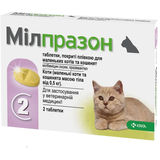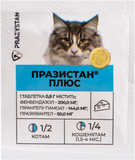Gastrointestinal parasites are a common problem in cats. They are found in almost half of individuals. Most often, parasites are noted in kittens. The presence of helminths can be asymptomatic or have pronounced manifestations.
Nematodes - what are they?
Nematodes are a type of roundworms that are common in cats. They have a thread-like or spindle-like shape. There are several types:
Worms are attached to the walls of the intestine or other tissue and live by feeding on the blood of their host. You can get rid of parasites only by using deworming products for cats, which must be prescribed by a veterinarian.
Causes of nematodes
Nematodes may appear in a pet as a result of:
As a rule, worm eggs enter the gastrointestinal tract through the mouth. There, larvae emerge from them, which live in the intestine and feed on the blood of their carrier.
Why are nematodes dangerous?
In the animal's body, the hatched larvae turn into adult worms that begin to lay eggs. With feces, they are excreted, enter the environment and remain around the anus. Then the eggs get to a new host, and the cycle repeats.
Danger of nematodes:
Can you get a nematode from a cat?
Infection with feline roundworms, roundworms, and pinworms is possible through direct contact with a pet infected with parasites and non-observance of the simplest hygiene standards:
Observance of basic hygiene rules will help to avoid human helminth infection from one's own pet.
Prevention and treatment of nematodes
Infection with helminths in a cat can be manifested by a lack of appetite or apathy, or it can be completely asymptomatic. Therefore, to determine which parasite you have to deal with, you should take a test for the type of helminths every year. Small kittens need to be tested twice before they are 1 year old.
To eliminate various types of parasites, special treatment with anthelmintic drugs , which are given according to a special scheme, is necessary. Therefore, self-medication is impossible. You should consult a veterinarian.
For prevention, you should not let your pet near stray cats, which can be sources of infection. Pets should be dewormed at least once every three to four months. You also need to carry out regular flea treatment and follow sanitary rules.


























































